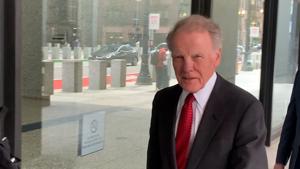Former Illinois House Speaker Michael Madigan’s crimes against the people of Illinois warranted a sentence of 105 years – just for his role in the ComEd bribes for influence scandal, according to the federal guidelines.
But U.S. District Judge John Blakey gave Madigan 7.5 years and a $2.5 million fine. Blakey said the 105 number was essentially meaningless.
Apologies, your honor, but that number was not meaningless: not for the Illinoisans who had so much of their democracy stolen by this one man. It may well take 105 years to recover our democracy after Madigan warped that system into one-party rule and then distilled it again into a one-man rule.
Aspiring public leaders often read Machiavelli, but they might do better to study Madigan’s 50 years in the Illinois General Assembly. It serves as either a “how-to” or cautionary tale, depending on where their moral compasses point.
Madigan spoke in his own defense, saying: “I’m truly sorry for putting the people of the state of Illinois through this. I tried to do my best to serve the people of the state of Illinois,” he said. “I am not perfect.”
Blakey was alternately sympathetic and “disgusted” by Madigan lying during the June 13 sentencing, but what stood out was a disturbing comment characterizing Madigan as a “dedicated public servant.”
Really.
Madigan served, but not the public. He gathered power for his own gratification and profited from it, mainly by granting favors for the few and amassing IOUs and campaign cash to use for more power. Getting his friends jobs and internships and board seats was the heart of the ComEd scandal, with the payoff being a state law worth $400 million in shareholder value for the utility.
He also used his power to enrich himself, putting his juice behind Cook County property tax appeals that taxpayers should have been able to procure for themselves by filling out a form.
“The Velvet Hammer” was a quiet, obscure figure who actively avoided the movie-worthy bombast and throwing bill pages in the air on the Illinois House floor. He busied himself with maps. He paid attention to the rules of order. He changed them over decades and left Illinois with a centralized power structure that has yet to be nicked, much less dismantled.
He channeled bills through a committee he controlled, so no lawmaker could get anything done without Madigan’s nod. He did favors for the state’s public employee unions that gave them lavish pensions and contracts so they would give him campaign cash.
That, again, gave him control. He doled out money to his loyal lawmakers. He punished those who crossed him by funding primary election opponents. He gave his friends safe political districts where no opponents could seriously challenge them.
His power over voters began in the 1980s, when Chicagoans were headed to the suburbs. Madigan saved 10 spots in the Illinois General Assembly for Chicago Democrats by drawing political district maps that nipped off just enough of the suburbs to dilute their voting strength and keep his city friends in power. The map master did it again when voters cut down the Illinois House numbers, ensuring 43 of the 59 vanishing seats belonged to Republicans.
Power over bills. Power over politicians. Power over voters. Power for its own sake.
His structure remains. Its inertia keeps Illinois state lawmakers from acting in taxpayer’s interests regarding public unions, from fixing the state’s wobbly finances, from controlling its $143.7 billion pension debt, from allowing examination and debate when a record $55.2 billion budget is passed that, yet again, needs to be propped up with tax hikes.
Fixing Illinois means junking Madigan’s machine – no small task because it is well-armored and defended by zealots. The needed changes include:
• Take the political maps away from state lawmakers. No one should be able to select the voters who will elect them. Illinois lets lawmakers draw both state legislative and congressional districts, when that should be the task of an independent group.
• Impose ethical reforms. Lawmakers should wait two years after leaving the Statehouse before they are allowed to lobby their former peers. They should report their finances and the finances of their immediate family and be mandated to recuse themselves when those interests conflict with Illinoisans’ interests.
• Unmuzzle the legislative watchdog. The legislative inspector general should be able to issue subpoenas on its own and publish findings of wrongdoing without getting permission from cronies of the lawmakers they are supposed to watch.
• Reform Madigan’s House rules. Illinois House Speaker Chris Welch enjoys the same control Madigan enjoyed, but without the same campaign cash power. The House Rules give him the ability to put his people in key positions and bottle up bills so lawmakers must gain his favor. The rules must change so one person cannot halt the ideas that could fix how Illinois government operates, taxes and influences Illinoisans’ lives.
Madigan’s politics were criminal. He will pay for 7.5 of his 105 years’ worth of crimes.
But there were plenty of unindicted co-conspirators who remain. We need reformers to rise and voters to back them and expel Madigan’s minions.





